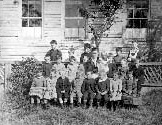
| Introduction | Victorian Childhood | Philanthropy | BC Protestant Orphans' Home | References | Site Information |
"The purpose
of the Society is
to receive and provide
a home for orphan
destitute or other children
requiring such care,
and to educate them
in the Protestant Faith,
and instruct them in
the elements of
secular knowledge."
Incorporation documents
BC Protestant Orphans' Home
1892
INTRODUCTION
The
British Columbia Protestant Orphans' Home was founded in Victoria in
1873. Established to provide care, education and religious
teaching to orphans and other children in need, its roots can be traced
to the philanthropic movement of the 19th century and to the changing
concept of childhood among the middle class during the Victorian
era.
Motivated by their Christian principles and a desire to improve the lives of the less fortunate in the young colony, the Cridges and others began to receive orphans into their own homes. Their actions led to a cooperative effort among the Protestant churches and the formation of the BC Protestant Orphans' Home.
This website looks at the BC Protestant Orphans' Home using a microhistorical analysis, setting this local institution - and the individuals connected to it - within the larger context of influences that shaped its inception and growth.
Motivated by their Christian principles and a desire to improve the lives of the less fortunate in the young colony, the Cridges and others began to receive orphans into their own homes. Their actions led to a cooperative effort among the Protestant churches and the formation of the BC Protestant Orphans' Home.
This website looks at the BC Protestant Orphans' Home using a microhistorical analysis, setting this local institution - and the individuals connected to it - within the larger context of influences that shaped its inception and growth.
What is Microhistory?
Micro-history
is a small-scale study of the past that commonly focuses on
low-population areas and individuals who are ignored or undervalued in
macro-history. This branch of history became popularized in the
late 1960’s as a result of rising concern over the
macro-historical assumptions of pattern, causation, and order which
created “anonymous structures and processes” of individuals’
experiences. Whereas the macro-historical past emphasizes
politics, economics and collectives, micro-history stresses “the
conditions of everyday life as they are experienced by common
people.” Focus on the more qualitative aspect of the
past provides a more personal account of the human past.
Victoria’s Victoria and the Protestant Orphans’ Home
The Victorian Era (1837-1900) is the stage on which the Protestant Orphans’ Home was founded (1873). In 1867 Queen Victoria signed the law that created Canada as a nation: four years later British Columbia joined Canada with Victoria as the capital. Social and political reform occurred in tandem with the Home’s development, which provides a context for understanding the philanthropic approach towards oppressed, marginalized and unaided residents of Victoria. While Victoria’s citizens were appealing to the British Crown for improved development of railways, buildings and naval bases the Cridges amongst others were working towards the improved shelter for children who plagued the towns streets. The Cridges, MacDonalds and John George Taylor are but a few social reformists who were instrumental in and exemplary of the compassionate concern for children without families. This characteristic spirit of the Victorian Era largely influenced the Home’s foundation.
The Victorian Era (1837-1900) is the stage on which the Protestant Orphans’ Home was founded (1873). In 1867 Queen Victoria signed the law that created Canada as a nation: four years later British Columbia joined Canada with Victoria as the capital. Social and political reform occurred in tandem with the Home’s development, which provides a context for understanding the philanthropic approach towards oppressed, marginalized and unaided residents of Victoria. While Victoria’s citizens were appealing to the British Crown for improved development of railways, buildings and naval bases the Cridges amongst others were working towards the improved shelter for children who plagued the towns streets. The Cridges, MacDonalds and John George Taylor are but a few social reformists who were instrumental in and exemplary of the compassionate concern for children without families. This characteristic spirit of the Victorian Era largely influenced the Home’s foundation.

The Orphans' home on the corner of Rae and Blanshard Streets, c1880
(BC Archives B-01570)
Archival Images
Documents
Site Map
top of page
top of page
© 2007 All Rights Reserved
[HOME] [VICTORIAN CHILDHOOD] [PHILANTHROPY] [ORPHANS' HOME] [REFERENCES] [SITE INFO]